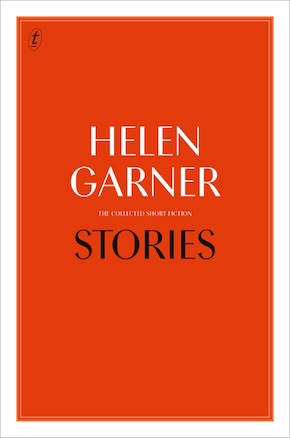The life of art
by Helen Garner
“A perfect introduction for first-timers who have not yet experienced the pleasures of Garner’s writing.” Sydney Morning Herald
My friend and I went walking the dog in the cemetery. It was a Melbourne autumn: mild breezes, soft air, gentle sun. The dog trotted in front of us between the graves. I had a pair of scissors in my pocket in case we came across a rose bush on a forgotten tomb.
“I don’t like roses,” said my friend. “I despise them for having thorns.”
The dog entered a patch of ivy and posed there. We pranced past the Elvis Presley memorial.
“What would you like to have written on your grave,” said my friend, “as a tribute?”
I thought for a long time. Then I said, “Owner of two hundred pairs of boots.”
When we had recovered, my friend pointed out a headstone which said, She lived only for others. “Poor thing,” said my friend. “On my grave I want you to write, She lived only for herself.”
We went stumbling along the overgrown paths.
~
My friend and I had known each other for twenty years, but we had never lived in the same house. She came back from Europe at the perfect moment to take over a room in the house I rented. It became empty because the man – but that’s another story.
~
My friend has certain beliefs which I have always secretly categorised as batty. Sometimes I have thought, “My friend is what used to be called ‘a dizzy dame’.” My friend believes in reincarnation: not that this in itself is unacceptable to me. Sometimes she would write me long letters from wherever she was in the world, letters in her lovely, graceful, sweeping hand, full of tales from one or other of her previous lives, tales to explain her psychological make-up and behaviour in her present incarnation. My eye would fly along the lines, sped by embarrassment.
~
The boys in the band were students too. We fancied them, but at twenty-two we felt ourselves to be older women, already fading, almost predatory. We read The Roman Spring of Mrs Stone. This was in 1965; before feminism.”
My friend is a painter.
~
When I first met my friend she was engaged. She was wearing an antique sapphire ring and Italian boots. Next time I saw her, in Myers, her hand was bare. I never asked. We were students then. We went dancing in a club in South Yarra. The boys in the band were students too. We fancied them, but at twenty-two we felt ourselves to be older women, already fading, almost predatory. We read The Roman Spring of Mrs Stone. This was in 1965; before feminism.
~
My friend came off the plane with her suitcase. “Have you ever noticed,” she said, “how Australian men, even in their forties, dress like small boys? They wear shorts and thongs and little stripy T-shirts.”
~
A cat was asleep under a bush in our backyard each morning when we opened the door. We took him in. My friend and I fought over whose lap he would lie in while we watched TV.
~
My friend is tone deaf. But she once sang ‘Blue Moon’, verses and chorus, in a talking, tuneless voice in the back of the car going up the Punt Road hill and down again and over the river, travelling north; and she did not care.
~
My friend lived as a student in a house near the university. Her bed was right under the window in the front room downstairs. One afternoon her father came to visit. He tapped on the door. When no one answered he looked through the window. What he saw caused him to stagger back into the fence. It was a kind of heart attack, my friend said.
~
My friend went walking in the afternoons near our house. She came out of lanes behind armfuls of greenery. She found vases in my dusty cupboards. The arrangements she made with the leaves were stylish and generous-handed.
~
Before either of us married, I went to my friend’s house to help her paint the bathroom. The paint was orange, and so was the cotton dress I was wearing. She laughed because all she could see of me when I stood in the bathroom were my limbs and my head. Later, when it got dark, we sat at her kitchen table and she rolled a joint. It was the first dope I had ever seen or smoked. I was afraid that a detective might look through the kitchen window. I could not understand why my friend did not pull the curtain across. We walked up to Genevieve in the warm night and ate two bowls of spaghetti. It seemed to me that I could feel every strand.
~
My friend’s father died when she was in a distant country.
“So now,” she said to me, “I know what grief is.”
“What is it?” I said.
“Sometimes,” said my friend, “it is what you expect. And sometimes it is nothing more than bad temper.”
When my friend’s father died, his affairs were not in order and he had no money.
~
My friend was the first person I ever saw break the taboo against wearing striped and floral patterns together. She stood on the steps of the Shrine of Remembrance and held a black umbrella over her head. This was in the 1960s.
~
My friend came back from Europe and found a job. On the days when she was not painting theatre sets for money she went to her cold and dirty studio in the city and painted for the other thing, whatever that is. She wore cheap shoes and pinned her hair into a roll on her neck.
~
My friend babysat, as a student, for a well-known woman in her forties who worked at night.
“What is she like?” I said.
“She took me upstairs,” said my friend, “and showed me her bedroom. It was full of flowers. We stood at the door looking in. She said, ‘Sex is not a problem for me.’”
~
When the person… the man whose room my friend had taken came to dinner, my friend and he would talk for hours after everyone else had left the table about different modes of perception and understanding. My friend spoke slowly, in long, convoluted sentences and mixed metaphors, and often laughed. The man, a scientist, spoke in a light, rapid voice, but he sat still. They seemed to listen to each other.
“I don’t mean a god in the Christian sense,” said my friend.
“It is egotism,” said the man, “that makes people want their lives to have meaning beyond themselves.”
~
My friend and I worked one summer in the men’s underwear department of a big store in Footscray. We wore our little cotton dresses, our blue sandals. We were happy there, selling, wrapping, running up and down the ladder, dinging the register, going to the park for lunch with the boys from the shop. I was happy. The youngest boy looked at us and sighed and said, “I don’t know which one of youse I love the most.” One day my friend was serving a thin-faced woman at the specials box. There was a cry. I looked up. My friend was dashing for the door. She was sobbing. We all stood still, in attitudes of drama. The woman spread her hands. She spoke to the frozen shop at large.
“I never said a thing,” she said. “It’s got nothing to do with me.”
I left my customer and ran after my friend. She was halfway down the street, looking in a shop window. She had stopped crying. She began to tell me about… but it doesn’t matter now. This was in the 1960s; before feminism.
~
My friend came home from her studio some nights in a calm bliss. “What we need in work,” she said, “are those moments of abandon, when the real stuff runs down our arm without obstruction.”
~
My friend cut lemons into chunks and dropped them into the water jug when there was no money for wine.
~
We went to Royal Park and flew a kite that her husband had made. The nickname he had for her was one he had picked up from her father. They both loved her, of course.”
My friend came out of the surgery. I ran to take her arm but she pushed past me and bent over the gutter. I gave her my hanky. Through the open sides of the tram the summer wind blew freely. We stood up and held on to the leather straps. “I can’t sit down,” said my friend. “He put a great bolt of gauze up me.” This was in the 1960s; before feminism. The tram rolled past the deep gardens. My friend was smiling.
~
My friend and her husband came to visit me and my husband. We heard their car and looked out the upstairs window. We could hear his voice haranguing her, and hers raised in sobs and wails. I ran down to open the door. They were standing on the mat, looking ordinary. We went to Royal Park and flew a kite that her husband had made. The nickname he had for her was one he had picked up from her father. They both loved her, of course. This was in the 1960s.
~
My friend was lonely.
~
My friend sold some of her paintings. I went to look at them in her studio before they were taken away. The smell of the oil paint was a shock to me: a smell I would have thought of as masculine. This was in the 1980s; after feminism. The paintings were big. I did not ‘understand’ them; but then again perhaps I did, for they made me feel like fainting, her weird plants and creatures streaming back towards a source of irresistible yellow light.
~
“When happiness comes,” said my friend, “it’s so thick and smooth and uneventful, it’s like nothing at all.”
~
My friend picked up a fresh chicken at the market. “Oh,” she said. “Feel this.” I took it from her. Its flesh was pimpled and tender, and moved on its bones like the flesh of a very young baby.
~
I went into my friend’s room while she was out. On the wall was stuck a sheet of paper on which she had written: “Henry James to a friend in trouble: ‘throw yourself on the alternative life… which is what I mean by the life of art, and which religiously invoked and handsomely understood, je vous le garantis, never fails the sincere invoker – sees him through everything, and reveals to him the secrets of and for doing so.’”
~
I was sick. My friend served me pretty snacks at sensitive intervals. I sat up on my pillows and strummed softly the five chords I had learnt on my ukulele. My friend sat on the edge of a chair, with her bony hands folded round a cup, and talked. She uttered great streams of words. Her gaze skimmed my shoulder and vanished into the clouds outside the window. She was like a machine made to talk on and on forever. She talked about how much money she would have to spend on paint and stretchers, about the lightness, the optimism, the femaleness of her work, about what she was going to paint next, about how much tougher and more violent her pictures would have to be in order to attract proper attention from critics, about what the men in her field were doing now, about how she must find this out before she began her next lot of pictures.
“Listen,” I said. “You don’t have to think about any of that. Your work is terrific.”
“My work is terrific,” said my friend on a high note, “but I’m not.” Her mouth fell down her chin and opened. She began to sob. “I’m forty,” said my friend, “and I’ve got no money.”
I played the chords G, A and C.
“I’m lonely,” said my friend. Tears were running down her cheeks. Her mouth was too low in her face. “I want a man.”
“You could have one,” I said.
“I don’t want just any man,” said my friend. “And I don’t want a boy. I want a man who’s not going to think my ideas are crazy. I want a man who’ll see the part of me that no one ever sees. I want a man who’ll look after me and love me. I want a grown-up.”
I thought, if I could play better, I could turn what she has just said into a song.
“Women like us,” I said to my friend, “don’t have men like that. Why should you expect to find a man like that?”
“Why shouldn’t I?” said my friend.
“Because men won’t do those things for women like us. We’ve done something to ourselves so that men won’t do it. Well – there are men who will. But we despise them.”
My friend stopped crying.
I played the ukulele. My friend drank from the cup.
from Stories: The Collected Short Fiction (Text Publishing, hardback, £12.99)
 Helen Garner lives in Melbourne, where she writes novels, stories, screenplays and works of non-fiction. In 2006 she received the inaugural Melbourne Prize for Literature, and in 2016 she won the prestigious Windham–Campbell Prize for non-fiction and the Western Australian Premier’s Book Award. Her most recent book, Everywhere I Look won the 2017 Indie Book Award for Non-Fiction. Stories is published by Text Publishing together with the non-fiction collection True Stories (hardback, £25,) to mark Helen Garner’s 75th birthday.
Helen Garner lives in Melbourne, where she writes novels, stories, screenplays and works of non-fiction. In 2006 she received the inaugural Melbourne Prize for Literature, and in 2016 she won the prestigious Windham–Campbell Prize for non-fiction and the Western Australian Premier’s Book Award. Her most recent book, Everywhere I Look won the 2017 Indie Book Award for Non-Fiction. Stories is published by Text Publishing together with the non-fiction collection True Stories (hardback, £25,) to mark Helen Garner’s 75th birthday.
More info
Author portrait © Nicholas Purcell


